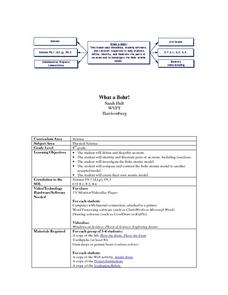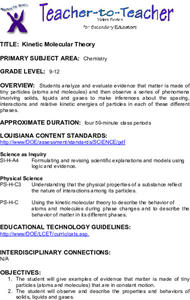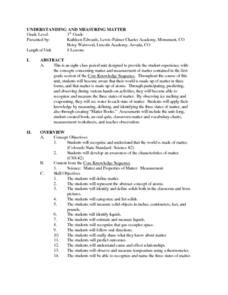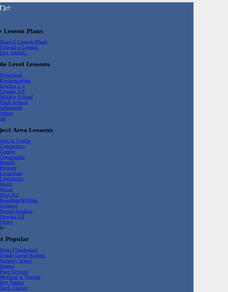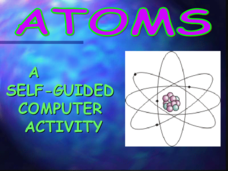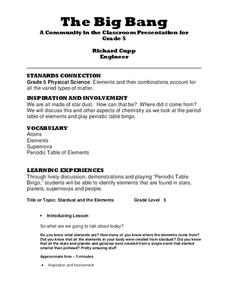Curated OER
6260 Atoms Test
In these chapter test worksheets students will multiple choice questions on atoms. Students will complete 77 questions on atoms to complete the chapter test.
Curated OER
General Chemistry
In this chemistry worksheet, students identify the name and abbreviation of the SI unit for mass, length, time, electric current, and temperature. Then they give the abbreviation for each of the units listed and describe what they are...
Curated OER
Balancing Act
In this chemistry instructional activity, students determine the number of atoms in each element and select one that is not equal on both sides of the equation. Then they add a coefficient in front of the formula with that element and...
Curated OER
Atomic Models
Students explain scientists' ideas about the structure of the atom over the last century. They develop a pictorial history of the changing ideas about the atom and write a caption describing the scientific thinking behind the model.
Curated OER
Flambe Elements
Eighth graders discuss atoms and electrons as well as atoic structure. They view atomic structure via the computer. Students watch a demonstration in which the teacher demonstrates glass tubing turning yellow in a Bunsen Burner flame....
Curated OER
What a Bohr!
Students define, identify and illustrate the parts of an atom, and investigate the Bohr atomic model. Students watch a multimedia presentation to understand an atom's parts and their functions. In groups, they create a model of an atom...
Curated OER
It's Elemental, My Dear Students
Eighth graders research the structure of the atom. They identify the properties of subatomic particles, including mass and electrical charge. Students access the websit www.chem4kids and extract 10 main facts from the content provided...
Curated OER
Activity 1 Up, Up, and Away: Building a Hot Air Balloon
Middle schoolers investigate the question: "How does a hot air balloon work?" They build small hot air balloons ans then lauch them. Students discuss how they think a hot air balloon floats. Pupils are introduced to the use of models...
Curated OER
Atomic Structure - Part A
Students describe the structure of atoms, including the particles that make them up. They recognize that key scientists and experiments have contributed to the changes
in the Atomic Theory.
Curated OER
Atomic Structure
Students list the names and symbols of common elements. They describe the present model of the atom. Students describe how electrons are arranged in an atom. They identify quarks as particles of matter that make up protons and...
Curated OER
Earth's Age: The Dating Game
Young scholars conduct a simulation to determine radioactive decay and half-life. Using pennies, dice or sugar cubes as isotopes placed in shoe boxes simulating rocks, they hold five trials representing 1000 years each to find the...
Curated OER
What's Matter?
Young scholars explore many of the basic properties of matter including atoms, ions, elements, molecules, and density. The class explores an interactive flash-animated Web site to answer questions and clarify misconceptions they might...
Curated OER
Kinetic Molecular Theory
High schoolers analyze and evaluate evidence that matter is made of tiny particles. They observe a series of phenomena involving solids, liquids, and gases to make inferences about the spacing, interactions and relative kinetic energies...
Curated OER
Understanding And Measuring Matter
First graders observe ice melting and water evaporating. They experiment with sugar and water and read the poem "Matter Really Matters." They define vocabulary words and sing a matter song.
Curated OER
What's the Matter? Locating Electrons in an Atom
Learners roll dice in order to simulate the probability of locating an electron in a certain region around the nucleus.
Curated OER
Static Electricity 1: Introducing Atoms
Middle schoolers explore webpages to research the nature of atoms, including electrons, protons, and neutrons. This lesson is the first of a four-part series on static electricity. They see that static electricity involves + and - charges.
Curated OER
Tootsie-Roll Pop Chemistry
Learners use Tootsie-Roll Pops to become familiar with atoms and chemical formulas. They, in groups, find more combinations of Tootsie-Roll Pops than the other lab groups within 3 minutes (Round 1), and within 5 minutes (Round 2).
Curated OER
Atoms and the Periodic Table
Familiarize your new chemists with the periodic table of elements by contemplating this collection of slides. Element groups are identified, atoms are defined, and nuclide notation is explained. Isotopes are also mentioned. The topics...
Curated OER
Atoms : A Self Guided Computer Activity
"Self-guided Computer Activity" simply means that young chemists read through the slides and take notes about atoms along the way. There is an abundance of text on each slide, making this a comprehensive introduction to atomic structure....
Curated OER
Defining the Atom
Words, words, words! This presentation uses plenty of them to define the atom, outline the history of what we know about atoms, and explain atomic and mass numbers. That's all! Informative, but not interesting, this slide show would be...
Curated OER
Reaction Reasoning
Third graders experiment with chemical reactions and examine what happens to the atoms when different reactions occur. In this matter lesson students divide into groups and complete a lab experiment.
Curated OER
The Big Bang
Fifth graders relate the elements in the human body to those produced during a supernova. In this space science and chemistry lesson, 5th graders listen to a lecture and view visuals about the big bang. They relate the production of...
Curated OER
Some Basic Chemical Ideas
In this chemistry learning exercise, learners fill in the blanks with the correct word from the word list. They examine the arrangement of elements in the periodic table.
Curated OER
Chemistry E3 Lesson Plan
Ninth graders perform a series of experiment to investigate heat transfer and phase changes. In this physical science lesson, 9th graders identify and calculate the different subatomic particles. They explain the importance of scientific...







